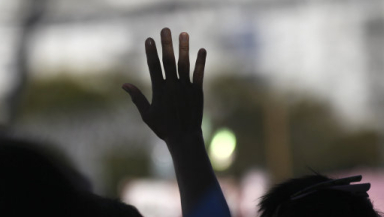
A Gallup survey released last week confirmed that there is still a strong correlation between religion and political party affiliation.
Gallup polled 30,000 Americans between January and June 2014, and found that "very religious" persons still tend to be Republicans, while the "moderately religious" and "nonreligious" tend to be Democrats.
Survey administrators defined a "very religious" person as one who reports that "religion is an important part of their daily lives and that they attend religious services every week or almost every week." These persons constituted 41 percent of the population, and 49 percent of the very religious were Republicans or leaning Republican.
Among very religious whites, 64 percent reported being Republicans, while very religious blacks were 77 percent Democrat. Very religious Hispanics were 46 percent Democrat, and 50 percent of very religious Asians were Democrats. Survey respondents could also report being Independent, not leaning toward either party.
The "nonreligious" were defined as those who reported that "religion is not an important part of their daily lives and that they seldom or never attend religious services." These persons composed 30 percent of the population, and 52 percent of them supported the Democratic Party.
Among nonreligious whites, 51 percent were Democrats, while 73 percent of nonreligious blacks reported being Democrat. Nonreligious Hispanics were 55 percent Democrat, and nonreligious Asians were 61 percent Democrat.
Moderately religious persons – those who said "religion is important in their lives but that they do not attend services regularly, or that religion is not important but that they still attend services" – made up 29 percent of the population. The disparity was less pronounced among this group, with 44 percent being Democrats and 38 percent being Republicans.
Race was again a factor, however, with 76 percent of moderately religious blacks reporting being Democrats or leaning towards the Democratic Party, and 51 percent of moderately religious whites being Republican. 51 percent of moderately religious Hispanic s and 59 percent of moderately religious Asians were Democrats.
The patterns described in the survey have been reported over the last six and a half years, according to Gallup. The company explained what the two parties can learn from the survey's results.
"From a practical politics standpoint, Republicans face the challenge of expanding their party's appeal beyond the minority of Americans who are very religious, and appealing to Hispanics and Asians given that even the most religious of these growing groups tilt Democratic," the research company said.
"Democrats face the challenge of attempting to broaden their party's appeal beyond the base of those who are moderately or nonreligious, a tactic that most likely will require effort to frame the party's positions on social justice and equality issues in a way that is compatible with a high degree of religiousness."













